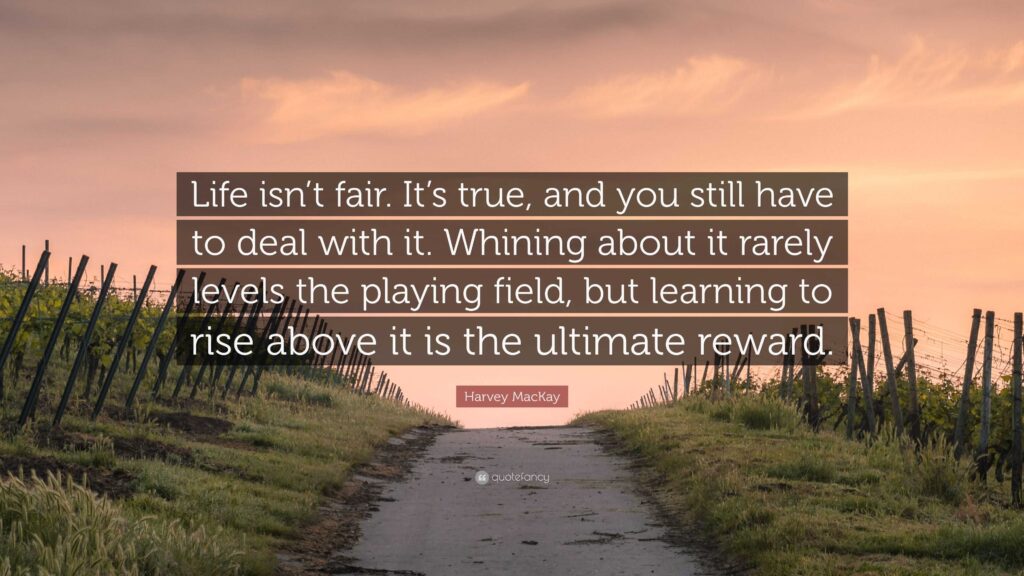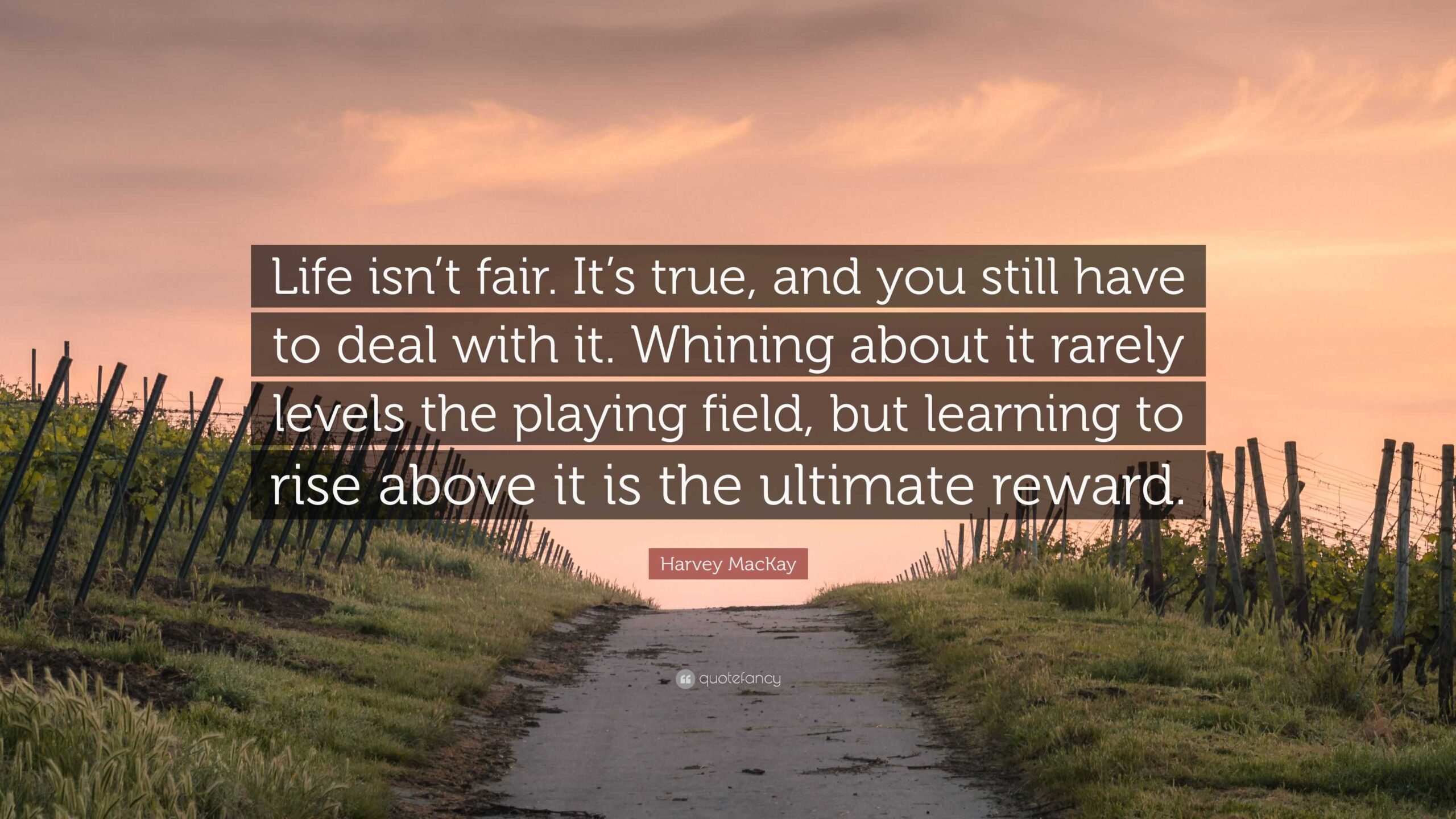
Life Isn’t Fair: Navigating Inequity and Finding Resilience
The phrase “life isn’t fair” is a common refrain, often uttered in moments of disappointment, frustration, or perceived injustice. While seemingly simple, this statement encapsulates a profound truth about the human experience. From unequal opportunities to unforeseen tragedies, the reality is that fairness is not a guaranteed aspect of life. This article delves into the multifaceted nature of life‘s inherent inequities, exploring the psychological impact, societal implications, and, most importantly, strategies for building resilience in the face of adversity. Understanding that life isn’t fair is the first step toward navigating its challenges with greater wisdom and fortitude. Recognizing this truth allows us to shift our focus from expecting fairness to cultivating inner strength and proactive problem-solving.
Understanding the Inherent Unfairness
The notion that life isn’t fair stems from a variety of sources. These can be broadly categorized into systemic inequalities, random chance, and individual circumstances. Systemic inequalities encompass disparities in access to education, healthcare, and economic opportunities based on factors such as race, gender, socioeconomic status, and geographic location. These are deeply ingrained structures that perpetuate advantages for some while disadvantaging others. Random chance, on the other hand, refers to the unpredictable events that can significantly impact an individual’s trajectory, such as accidents, illnesses, or natural disasters. These events are often arbitrary and can strike anyone, regardless of their merit or effort. Finally, individual circumstances, including family background, personal health, and innate abilities, also contribute to the uneven playing field of life.
Consider, for example, two individuals born into different families. One is raised in a supportive and resource-rich environment, with access to quality education, healthcare, and mentorship. The other is born into poverty, facing systemic barriers to education, limited access to healthcare, and exposure to violence and instability. Even if both individuals possess equal potential and work ethic, their outcomes are likely to diverge significantly due to these vastly different starting points. This disparity illustrates the fundamental truth that life isn’t fair.
The Psychological Impact of Perceived Injustice
Experiencing or witnessing unfairness can have a profound psychological impact. It can lead to feelings of anger, resentment, helplessness, and hopelessness. Individuals may develop a sense of learned helplessness, believing that their efforts are futile in the face of systemic barriers or random misfortune. This can result in decreased motivation, increased anxiety and depression, and a diminished sense of self-worth. Furthermore, the perception of injustice can erode trust in institutions, relationships, and even in the fairness of the world itself.
The constant awareness that life isn’t fair can also contribute to chronic stress. When individuals feel constantly disadvantaged or vulnerable, their bodies enter a state of heightened alert, triggering the release of stress hormones such as cortisol. Prolonged exposure to these hormones can have detrimental effects on physical and mental health, increasing the risk of cardiovascular disease, immune dysfunction, and mental health disorders. [See also: Managing Stress in the Modern World]
Coping Mechanisms and Building Resilience
While acknowledging that life isn’t fair can be disheartening, it is also an essential step toward developing effective coping mechanisms and building resilience. Resilience is the ability to bounce back from adversity, to adapt and thrive in the face of challenges. It is not about denying the existence of unfairness but rather about developing the inner strength and resources to navigate it effectively.
Acceptance and Reframing
One of the most important coping mechanisms is acceptance. Acknowledging that life isn’t fair allows individuals to release the expectation of perfect justice and to focus on what they can control. This does not mean condoning injustice or giving up on efforts to create a more equitable world. Rather, it means accepting that unfairness is an inherent part of the human experience and that dwelling on it can be counterproductive.
Reframing is another powerful technique. It involves changing the way we perceive a situation in order to alter its emotional impact. For example, instead of viewing a setback as a personal failure, it can be reframed as a learning opportunity. Similarly, instead of focusing on what we lack, we can focus on what we have and cultivate gratitude for the positive aspects of our lives. Reframing allows us to shift our perspective from victimhood to empowerment.
Developing a Growth Mindset
A growth mindset, as opposed to a fixed mindset, is the belief that abilities and intelligence can be developed through dedication and hard work. Individuals with a growth mindset view challenges as opportunities for growth and learning, rather than as threats to their self-esteem. They are more likely to persevere in the face of setbacks and to embrace effort as a path to mastery. Cultivating a growth mindset can be a powerful tool for building resilience and navigating the unfairness of life. [See also: The Power of Positive Thinking]
Seeking Support and Building Community
Social support is crucial for coping with adversity. Connecting with others who understand and validate our experiences can provide a sense of belonging and reduce feelings of isolation. Seeking support from family, friends, mentors, or therapists can provide a safe space to process emotions, gain perspective, and develop coping strategies. Building a strong community can also provide access to resources and opportunities that might otherwise be unavailable.
Advocating for Change
While focusing on individual resilience is important, it is equally important to advocate for systemic change. Addressing the root causes of inequality requires collective action and a commitment to creating a more just and equitable world. This can involve supporting policies that promote equal opportunity, challenging discriminatory practices, and raising awareness about social injustices. Engaging in activism and advocacy can empower individuals to feel like they are making a difference and can contribute to a sense of purpose and meaning.
The Role of Perspective and Gratitude
Perspective plays a vital role in how we perceive the fairness, or lack thereof, in our lives. Often, focusing solely on our own challenges can lead to a distorted view of reality. Taking a step back and considering the broader context, including the experiences of others, can help us gain a more balanced perspective. Recognizing that others may be facing even greater hardships can foster empathy and gratitude for the blessings we do have. This doesn’t diminish our own struggles, but it can provide a sense of context and prevent us from becoming overly fixated on our own perceived injustices.
Cultivating gratitude is a powerful practice for shifting our focus from what we lack to what we have. Regularly expressing gratitude for the positive aspects of our lives, no matter how small, can improve our mood, increase our sense of well-being, and foster resilience. Gratitude can also help us appreciate the good things in our lives more fully and prevent us from taking them for granted. Even in the face of significant challenges, there are always things to be grateful for, whether it’s the support of loved ones, the beauty of nature, or the simple ability to breathe.
Turning Adversity into Opportunity
While life isn’t fair, adversity can often serve as a catalyst for growth and transformation. Many individuals who have faced significant challenges have emerged stronger, wiser, and more compassionate as a result. Overcoming adversity can build resilience, foster creativity, and deepen our understanding of ourselves and the world around us. It can also inspire us to make a positive impact on the lives of others.
Consider the stories of individuals who have turned personal tragedies into opportunities to advocate for change or to support others facing similar challenges. These individuals demonstrate the power of resilience and the potential for adversity to be a source of strength and inspiration. By reframing our experiences and focusing on what we can learn from them, we can transform adversity into an opportunity for growth and positive change. Recognizing that life isn’t fair pushes us to innovate and strive for better outcomes, not just for ourselves but for others as well. [See also: Inspirational Stories of Overcoming Obstacles]
Conclusion
The reality that life isn’t fair can be a difficult truth to accept. However, acknowledging this reality is the first step toward navigating its challenges with greater wisdom and resilience. By developing effective coping mechanisms, cultivating a growth mindset, seeking support, and advocating for change, individuals can build the inner strength and resources to thrive in the face of adversity. While we may not be able to control all of the circumstances that befall us, we can control how we respond to them. By focusing on what we can control, cultivating gratitude, and turning adversity into opportunity, we can create a meaningful and fulfilling life, even in the face of unfairness. Embracing the fact that life isn’t fair can ultimately lead to a deeper appreciation for the good things in our lives and a greater commitment to creating a more just and equitable world for all. Understanding that life isn’t fair is not an excuse for complacency, but rather a call to action – a reminder that we must work tirelessly to create a world where opportunity is more evenly distributed and where everyone has the chance to reach their full potential. Life isn’t fair, but that doesn’t mean we should stop striving to make it better.

